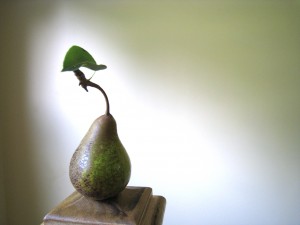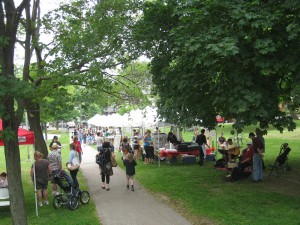If this documentary video doesn’t make you want to ditch the city and get out into some more harvest-time-country-fair action, I don’t know what.
It’s all about the local food scene in Quebec’s Eastern Townships, a region very close to my heart, where I grew up. The film is made by two friends in Montreal. Nice work, ladies!
For full episode, go to The Townshipper’s Table on cbc.ca.
Here’s a YouTube preview:

I went pear picking this morning (for the first time ever). It was well worth the early rise on this last day of real summer. The pick was organized by the Halton Fruit Tree Project, a volunteer-based group that picks excess fruit from private property in the area, and then donates it to local food banks. And of course the volunteers get a cut too.
Similar organizations exist all over:
St. John’s Fruit Tree Project by Root Cellars Rock!, St. John’s
urban Orchard by reachAbility, Halifax
Les Fruits Défendus, by Santropol roulant, Montreal,
Hidden Harvest Ottawa
Not Far From the Tree, Toronto
Mississauga Fruit Tree
Hamilton Fruit Tree Project
The Appleseed Collective, Guelph
Out of Your Tree, Saskatoon (winner of the Best Name Award)
Calgary Urban Harvest Project
Operation Fruit Rescue Edmonton
Vancouver Fruit Tree Project
The Sharing Farm Society, Richmond
Lifecycles Fruit Tree Project, Victoria
And that’s just for Canada, for all 7 of us.
I love the whole idea. It’s so simple – and makes sense. If you love local, I seriously suggest you jump on this bandwagon, because it’s actually more like a fun hayride.
Not only does so-called excess food not go to waste (by simply rotting untouched on the ground), it becomes available to people in your community who may not normally have access to fresh fruit, in season, at the height of ripeness and peak of deliciousness. On top of that, you can meet some like-minded people in your area and take home a sweet cut of the bounty.
I am no Martha Stewart, but I am stoked about what to make with these pears—a pie maybe, or compote? Or shall I branch out and try a pear chutney? Ding! That’s the winner.
This morning was a great way to end summer – and I am psyched that the Halton Fruit Tree Project has a few more picks left in its season. Count me in.
Ontario schools introduced some sweeping food changes to their cafeterias in 2010. The School Food and Beverage Policy forbade the sale of foods with “few or no nutrients, and/ or contain high amounts of fat, sugar or sodium.” Sounds like a good thing, right? Healthier food for kids helps them grow, think more clearly and do better in school. I give the move a ringing endorsement all round. The thing is, the changes have resulted in driving some kids out of the cafeteria altogether — and into nearby convenience stores and fast-food chains, where their business is received with open arms.
But can you blame the kids? After all, wasn’t it always cooler to not eat at the caf?
Well, the Peel District School Board has made a move to change that. The secondary school students of the PDSB, which represents 150 000 students from K to 12, have just held their 2nd annual Cooking Up Action challenge, in which students compete to create enticing menu items using local and sustainable ingredients. The winning recipes will even be added to the lunch menus at PDSB cafeterias in September 2012. Not bad.
The challenge is part of the School Food Action Coalition project, facilitated by Eco Source, a local environmental organization, in partnership with Chartwells, the PDSB foodservice supplier, and Peel Public Health.
In all, 55 teams competed this year, using local ingredients and complying with Ontario’s School Food and Beverage Policy to earn extra points. There were three winning recipes: Sweet Potato & Pear Soup and Blueberry Muffins from Clarkson Secondary School, and Chicken Penne from John Fraser Secondary School.
To make sure flavour, appearance and the joy of eating weren’t lost in the mix, PDSB students themselves sat on the final judging panel, along with reps from Peel Public Heath and Chartwells.
The goal of the challenge, says Stephanie Crocker, Associate Director of Eco Source, was to engage the students with food and provide a hands-on learning experience about local food and healthy eating. And of course, give some options at the caf that might just give the corner store a run for its money.
Check out how the participants from last year did. I love these guys!
Cooking Up Action 2011 5:46 min.
A food activist friend sent me a little article from the Globe and Mail not long ago about how local food may not always be the most ethical choice.
I was intrigued. I tend to hold up local on a pedestal as an example of socially, economically and environmentally responsible sustainable farming. Silly me!
I picture friends who run family farms, use woofers and sell organics at outdoor markets, small stores and select restaurants. Again, silly me!
The article, Local food = ethical food? Doesn’t always work that way, by Wency Leung, challenges us to extend our consumer awareness to the condition and treatment of farm workers in our own backyard.
If you boycott companies because they use child labour or don’t allow pee breaks on the assembly line, why would you buy cucumbers from the guy who poisons his workers and pollutes the land right next to you?
Just because Farmer Brown is only down the road a ways does not mean that he is necessarily a great guy who treats his workers, animals and land well.
Yes, this is a tough one. I want to support farmers; they are the ones who feed us. But I think this is a reminder that we need to consider the ethical behavior of the farmer – our local farmer — when buying our food. As Leung ‘s article suggests, the simple fact that he’s close by may not mean he deserves our business.
Whether you’re in Ontario, Oklahoma or Oxley, UK, if you are inspired by sustainable farming, eating local and nothing less than transforming our food system, check out the videos on Sustain Ontario’s new microsite, Growing Good Food Ideas.
While all these film shorts, made by Powerline Films, focus on Canada’s most populous (for now) province, the stories are global, and show the power of farming and the potential for change. Enjoy!
Despite the rain and chilly weather today, the fifth Picnic at the Brickworks was a feast of flavours that warmed the bellies of all who attended the open air space.
As a first-timer to this annual event, I didn’t know what to expect. I secretly feared foodie elitism might set the tone, but it couldn’t have been farther from the truth. It was a farm friendly, food lovin’ crowd who were happy to mix and enjoy some friendly conversation while sampling some of the tastiest dishes our region has to offer.
The food was fantastic. Seasonal harvests from throughout Southern Ontario’s culinary regions prepared by local chefs committed to sourcing their food from small scale, sustainable, local farms and suppliers.
It would be impossible for every delicious item from every table to be the ultimate winner, but I had the pleasure of enjoying a truly sublime locally sourced squab and bacon cassoulet with pistachio crumble from Auberge du Pommier, and from Canoe, Cumbrae Farms beef tartare with a pine jelly that took it up just the right notch.
Thank you to Evergreen and Slow Food Toronto for making high-end fare a little more user friendly.
Something good is happening. It’s happening slowly, but it is happening nonetheless. People – institutions even—are beginning to see that having accessible healthy food is a necessity, something worth fighting for, and do-able.
In the US, the Huntington, West Virginia school made famous by chef Jamie Oliver’s tough love reality TV show “Food Revolution,” in which Oliver lambastes school directors for the poor quality food served to students, has now overhauled its food services to provide local, fresh, made-from scratch meals. And they achieved this in only two years. Today, the school is pretty much a model for what can be done.
And while hard-core foodies of various stripes may look down their noses at popular, for-the-masses TV shows like Food Revolution, the movement seems to be catching.
Here in Canada, with the new school year just started, schools throughout Ontario have implemented widespread improvements to the food available in cafeterias and in vending machines to help combat childhood obesity. Gone are the French fries, candy bars and colas. Say hello to baked potato wedges, thin crust multi-grain lo-so pizza, and juice.
While I think cafeterias could go farther in their step towards healthier meals, this is undeniably a step in the right direction.
Even hospitals are jumping in –- that last bastion of inedible food. In Scarborough, Ontario, a hospital has undertaken a one-year experiment to improve its food services and provide fresh, local food and scratch cooking to its patients.
Get the picture?
Even the higher ups, those who may arguably gain in the short term from lowering standards and cutting corners, recognize the value of food and the connection between food and health.
Times are changing. Food is becoming a mainstream issue. In the upcoming provincial elections happening throughout Canada, I encourage voters to make food an election issue.
In Ontario, visit Sustain Ontario to learn more about their Vote ON Food campaign.
…
In other happy food news:
If you’re in Toronto this weekend, it’s the 27th Annual Vegetarian Food Festival. Free event!
Where: 235 Queens Quay West
When: Friday 4 pm – 9 pm
Saturday 12 pm – 9 pm
Sunday 12 pm – 7 pm
The entire Toronto Urban Agriculture Program is under attack.
Last week, consultants, hired by the Mayor as part of the City Services Review, reported their findings in determining which services need to be reduced or cut entirely.
What they found was that 90% of services are in fact core or essential. Unable to find savings, the consultants are recommending cuts to recycling and environmental programs — including the Urban Agriculture program, which allows residents and community groups to grow healthy, fresh and affordable food on excess City parkland.
When did investments in our future become costs?
Hundreds of people went to City Hall last week to ask the committees to reject service cuts. But councilors have refused to take anything off the chopping block.
So now we have to wait for September, when the Mayor and his Executive Committee will decide if recycling programs, urban forestry goals and urban agriculture programs are ‘gravy’, or the building blocks of a progressive, sustainable, world-class city that this town wants to become.
Can’t afford to go to Europe this summer? Not to worry, Canada is bringing Europe here.
Canada and the European Union have reached an agreement on an equivalency in organic products. The agreement comes after almost four years of negotiations involving a long review of each other’s rules for organic food production and control systems.
The idea is to increase trade on both sides of the pond, no to mention boost Canada’s organic sector.
Suppliers can now import and export certified organic products between Canada and the EU without the need for additional certification. This means new markets for organic farmers and much less paperwork.
This is a good thing, right? More organics means more land is being used to produce food in a responsible and sustainable way. So yes, this is good. But I submit that local organic is still the way to go when possible.
Our Canadian market is already inundated with US-based organic products that often mirror mainstream food’s infrastructure in its packaging and transportation practices. Even non-organic local food, when in season, with its absent or minimal packaging and small carbon footprint, makes a better argument for sustainability.
So yes, buy EU organic. Let’s have a healthy, competitive organic market. But don’t neglect your local market — because if you want tasty, healthy food, fresh is still best.
Get the real deal with certified local farmers’ markets.
Have you been to a MyMarket? After being told by those who know I that I had to check out a MyMarket, I took advantage of some free time today and cycled over to East Lynn Park’s Thursday afternoon market — a small but growing neighbourhood farmers’ market just a stone’s throw from Woodbine and the Danforth.
Like the other MyMarkets around Toronto, East Lynn is certified MyPick™, which means the farms have been verified as authentically local, and the items the farmer is selling truly come from his or her farm. I.E. you are buying direct. No middleman. No food depot. No farmy re-packaging of someone else’s produce. It’s what a farmers’ market should be.
Diana Gonzalez, Toronto District Supervisor for MyMarket, explained to me that MyMarket inspectors go so far as to check the farmers’ seed invoices, as well as crops in the ground or livestock being raised, to ensure everything is on the up and up. And on every market day, market managers check that the items each farmer is selling match up with activities back at the farm.
All very impressive, right? That’s a lot of legwork and effort and time to make sure that the dollars you devote to supporting local food truly support local food.
It’s great. It’s crazy. It’s wonderful. I’m dizzy. So why aren’t we all shopping there?
Chatting with some of the farmers, I learned that shopper turn out can sometimes be quite poor – something they couldn’t understand because of “all houses all around us!” East Lynn is a relatively new market. If the neighbourhood wants to have continued access to fresh strawberries, sweet peas, wildflower honey, maple syrup and lamb chops, not to mention all the other baked treats I saw, it’s time to step up and show your support!
If we don’t support the local markets, our local farmers won’t bother coming in to see us, and we’ll be forced to shop for depot food at the supermarket.
C’mon out folks. It was a late spring, but it’s all coming up roses now!


